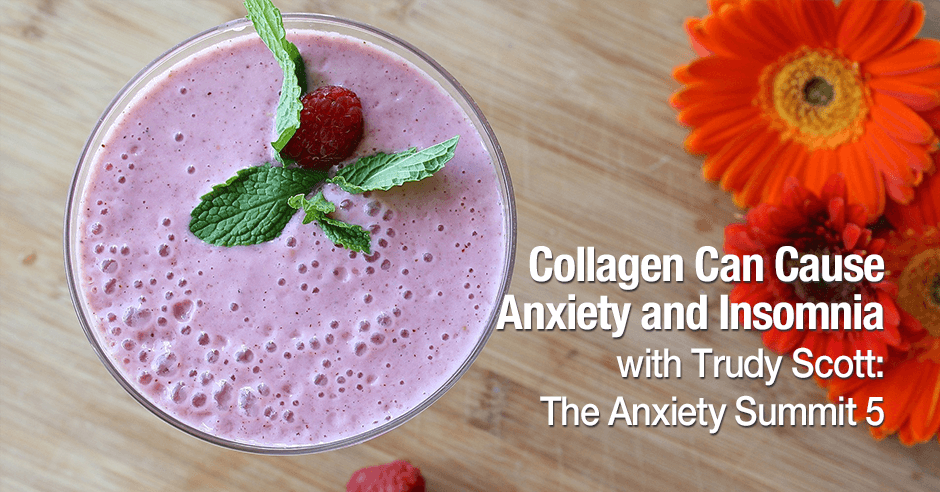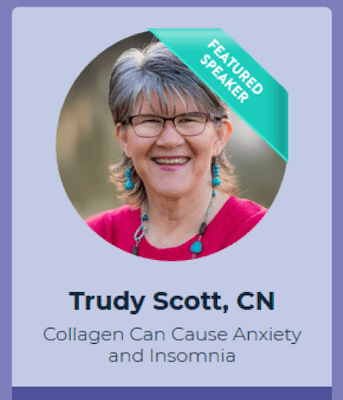One of my three interviews on The Anxiety Summit 5: Gut-Brain Axis is: Collagen Can Cause Anxiety and Insomnia. In this interview, I’m interviewed by my colleague and friend Dr. Nicole Beurkens, PhD, and you’ll learn:
- How acute tryptophan depletion lowers serotonin
- How to figure out if you may be susceptible to serotonin-lowering effects of collagen or gelatin
- About other factors to consider: Oxalates, glutamates, arginine, glyphosate and histamine
Collagen and gelatin are an excellent source of these amino acids: proline, glycine, glutamine and arginine BUT they do not contain the amino acid tryptophan. This can cause increased anxiety, worsening insomnia and even a low mood in individuals who are susceptible to the fact that both collagen and gelatin can lower serotonin levels.
We talk about some of this in a short in-person interview I recently did in San Diego, with my friend and colleague Tara Hunkin (who also happens to be speaking on the summit – on the topic of mitochondrial dysfunction and anxiety).
I actually blogged about this topic in Sept 2017 and updated the blog with a number of studies in Dec 2017. You can read about this and all the feedback from folks who have observed similar issues when consuming collagen and/or gelatin – Collagen and gelatin lower serotonin: does this increase your anxiety and depression? (there are also quite a few naysayers)
This will get you up to speed for the summit interview if you’re hearing this for the first time or if you read this back in 2017.
In the summit interview (Dr. Nicole Beurkens is my interviewer for this one) I review the theory and serotonin-depleting mechanisms, the 3 different effects folks are noticing and share some feedback from real people, as well as my story and what I experienced.
I also discuss a new paper that further supports this very probable connection: Use of tryptophan fortified hydrolyzed collagen for nutritional support. I share this about the study: “they were using hydrolyzed collagen – because the collagen is very well digested,- for people that were very severely nutritionally depleted. But they added in tryptophan to make it more of a complete protein” and presumably also prevent these mood and sleep issues.
The authors share this about hydrolyzed collagen and the addition of tryptophan for this population:
Standard hydrolyzed collagen is not a perfect amino acid according to the established standards because it does not contain the amino acid tryptophan. A tryptophan-fortified liquid hydrolyzed collagen supplement is, in fact, considered a complete protein. Forms of hydrolyzed collagen have been utilized for several decades as a dietary supplement. Collagen hydrolysate has been of interest as a potential therapeutic agent in the treatment of osteoarthritis and osteoporosis
Closer investigation of this product will reveal that it may indeed meet the protein requirements of a malnourished individual, containing an optimal amino acid composition, high bioavailability, and high digestibility.
In the summit interview we also talk about bone broths and a step-by-step approach to figure out if your issue with collagen is one of the following and what to do about it:
- low serotonin
- oxalates
- a histamine reaction
- a reaction to glutamates or glycine
- arginine
This is one of 4 interviews I do on the summit. My other 3 interviews are:
- GABA & Tryptophan: The Gut-Anxiety Connections (here is the blog for this one)
- Simple Solutions for Anxiety and Gut Health (I’ll share highlights from this ones in another email/blog)
- Glutamine, DPA and Tyrosine for Anxiety and Sugar Cravings
Please join us and listen to this interview and all the others on The Anxiety Summit 5: Gut-Brain Axis.
If you’d like to give feedback or ask a question, please post in the comments below.
I’d love to hear from you once you’ve listened in to my interview.
Until then let us know how you do use collagen or gelatin and if you’ve noticed any mood issues, increased anxiety or insomnia? And if it was due to low serotonin or something else?


